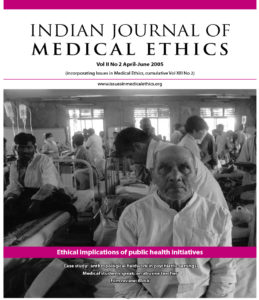
The editorials in this issue look at two recent decisions related to major public health programmes. One editorial comments on the context and implications of a Supreme Court judgement that sterilisations can done only by doctors with at least five years of post-graduate experience. Another editorial looks at the promises and challenges of the National Rural Health Mission, whose goals include training over 250,000 Accredited Social Health Activists in 18 states; strengthening health services; improving water supply sanitation and nutrition; expanding community health insurance, and enhancing accountability of public health institutions.
Some months ago, we received a submission from a recent medical graduate describing sexual harassment by a faculty member, with the proviso that the writer’s name not be published. At the time, it was decided not to publish anonymous submissions. However, discussions with other colleagues suggested that sexual harassment is a problem within medical institutions. As a result, IJME facilitated a web-based survey on sexual harassment in the medical workplace, whose results are published in this issue. While the results are not striking, it is hoped that they lead to further work on the subject. It was also decided to publish the anonymous submission in this issue; the journal’s new guidelines for authors describe when it will consider anonymous submissions. The guidelines are available on the website www.issuesinmedicalethics.org .
International fellowships are seen by some as an invaluable educational opportunity. A surgeon who runs such fellowships reflects on their strengths and weaknesses. Also included is a response from an Indian surgeon.
The announcement on the back page contains a call for papers for IJME’s National Bioethics Conference in November 2005. Those interested in participating in the conference are invited to act fast on this call. Programme updates and the application form are also available on the IJME website.
Cover photograph courtesy: IMAGE INDES
